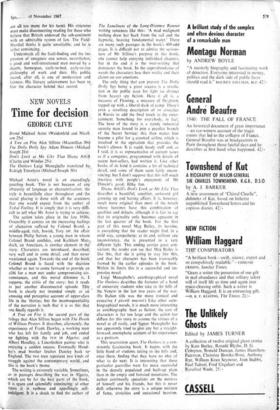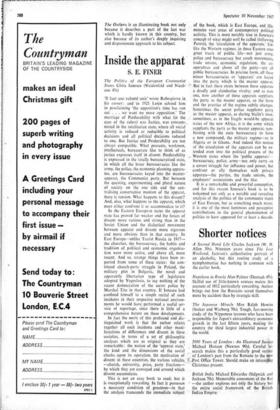NEW NOVELS
Time_ for decision
GEORGE CLIVE
A Tree on Fire Alan Sillitoe (Macmillan, 300 The Dolly Dolly Spy Adam Diment (Michael Joseph 21s) -
Don't Look at Me Like That Diana Athill (Chatto and Wind us 25s)
The Outlaws Luigi Meneghello translated by Raleigh Trevelyan (Michael-Joseph 30s) Michael Astor's novel is an exceedingly puzzling book. This is not because of any obscurity of language or characterisation; the style is beautifully clear throughout and the- social placing is done with all the acuteness that one would expect from the author of Tribal Feeling. It is simply that it is very diffi- cult to tell what Mr "Astor is trying to achieve.
The action takes place in the late 1930s. Ostensibly it centres on the increasing feelings of alienation suffered by Colonel Brand, a middle-aged, rich, Jewish, Tory IA P. An affair between Philip Sutton, a young man in whom Colonel Brand confides, and Kathleen Murx doch, an American, is another element in the story. Characters are introduced, described, very well and in some detail, and then never mentioned again. Towards the end of the bOok Colonel Brand is faced with the decision whether or not to come forward to provide an alibi for a man met under compromising cir- cumstances, and this moral dilemma- is,. I • suppose, the crisis of the story; but it reads as just another disconnected episode. Tbis book is clearly not intended simply as an amusing and perceptive account of upper-class life in the 'thirties; but the inconsequentiality of the narrative is such that it is as this that one finally regards it.
A Tree on Fire is the second part of the trilogy that Alan Sillitoe began with The Death of Williatn Posters. It describes, aliernately, the experiences of Frank Dawley, a working man who has left his family and job„ and ended up fighting with the FLN in Algeria; and Albert Handley, a Lincolnshire painter who is enjoying a sudden success. Eventually Hand- ley's mad brother fetches Dawley back to- England. The two men represent two kinds of struggle against the contemporary world, and this is the book's theme.
The writing is extremely variable. Sometimes, as in passages describing the war in Algeria, which are by far the best parts of the book,' it is spare and splendidly convincing; at other tittles it is verbose and appallingly self- indulgent. It is a shock to find the author of
The Loneliness of the Long-Distance Runner writing sentences like this: 'A mad malignant
nothing drew her back from the rail and the hypnotic, heaving fundamental water.' There are many such passages in the book's 400-odd pages. It is difficult not to admire the serious- ness of Mr Sillitoe's purpose in this book; one cannot help enjoying individual chapters, but in the end it is the over-writing that dominates the book. In the superabundance of words the characters lose their reality and their claims on our emotions.
The only thing that can prevent The Dolly Dolly Spy being a great success is a revolu- tion in the public taste for light (as distinct from heavy) spy fiction. Here it all is, a measure of Fleming, a measure of Deighton, topped up with a liberal dash of camp. There's even a revolting description of ss atrocities in Russia to add the final touch to the enter- tainment. Something for everybody, in fact. The hero of the story is a trendy industrial security man forced to join a peculiar branch of the Secret Service; this then makes him become a pilot for crooked airline, which is involved in the operation that provides the book's climax. It is rapid, heady stuff and, as I said, it is as representative of current tastes as if a computer, programmed with details of recent best-sellers, had written it. Like other books of its kind it contains a lot of technical detail, and some of them seem fairly uncon- vincing; but I don't suppose that this will much interfere with people's enjoyment of Mr Diment's good, filthy fun.
Diana Athill's Don't Look at Me Like That describes a beautiful, sensitive, awkward girl growing up and having affairs. It is, however, much more original than most of the novels whose heroines have this combination of qualities and defects, although it is fair to say that its originality only becomes apparent in the last quarter of the book. For the first part of this novel Meg Bailey, its heroine, is everything that the reader might find, in a mild way, sympathetic; at its end, without any inconsistency, she is presented in 'a very different light. This ending carries great con- viction; the reader can see that Meg Bailey is like this, that she is going to stay, like' this, and that her character his been irrevocably formed by the earlier episodes in the book. Within its limits this is a successful and im- pressive novel.
Luigi Meneghello's autobiographical novel The Outlaws describes the fortunes of a band of university students who take to the hills of the Veneto in the last two years of the war. (Its Italian title was the more ironical and evocative 1 piccoli maestri.) Like other auto- biographical novels, it is much more interesting as autobiography than as fiction; the cast of characters is far too large and the action too diffuse for this story to assume the virtues of a novel at all easily, and Signor Meneghello has not apparently tried to give any but a straight- forward, unemphatic account of his experiences as a partisan.
This reservation apart, The Outlaws is a con- sistently fascinating book. It begins with the little band of students. taking to the hills and, once there, finding that they have no idea of what to do next. It is interesting that these particular guerrillas were far more successful in the densely populated and built-up plain than in the empty and forested mountains. The author continually speculates on the motives of himself and his friends, but this is never dull; otherwise the story is a unique mixture of farce, atrocities and occasional heroism.
The Outlaws is an illuminating book not only because it describes a part of the last war which is hardly known in this country, but also because of its author's deeply inquiring and dispassionate approach to his subject.







































 Previous page
Previous page